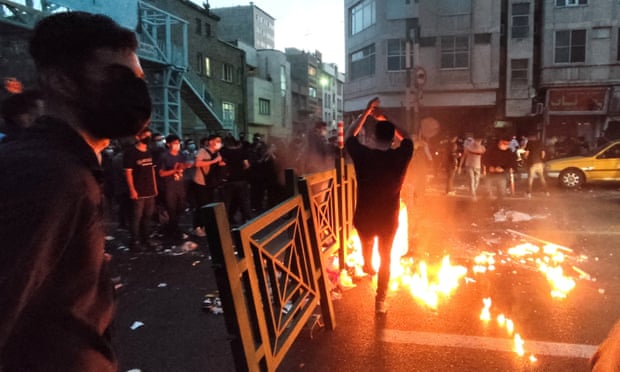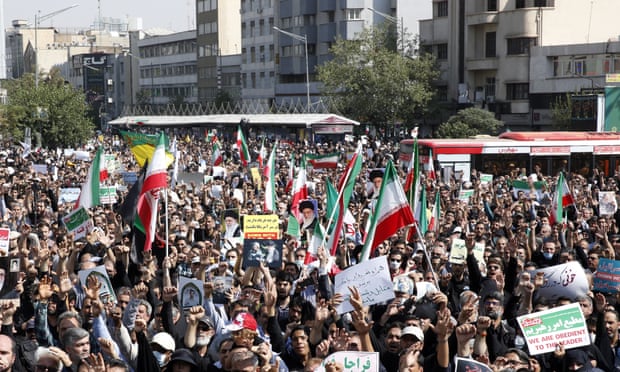Pro-government rallies held in Iran amid mass protests
DUBAI, United Arab Emirates (AP) — Iranian counterprotesters gathered across the country on Friday in a show of support for authorities after nearly a week of anti-government protests and unrest over the death of a young woman who was being held by the morality police.
Thousands attended a rally in the capital, Tehran, where they waved Iranian flags, and similar demonstrations were held in other cities. The government claimed the demonstrations of support were spontaneous. Similar rallies have been held during past periods of widespread protests.
The pro-government demonstrators chanted against America and Israel, according to state media, reflecting the official line that blames the latest unrest on hostile foreign countries.
State TV suggested late on Friday that the death toll from this week's unrest could be as high as 35, raising an earlier estimate of 26. Anti-government protesters and security forces have clashed in several major cities in the most severe political violence since 2019, when rights groups say hundreds were killed amid demonstrations against a hike in state-controlled gasoline prices.
Iran has also disrupted internet access and tightened restrictions on popular platforms like Instagram and WhatsApp, which can be used to organize rallies.
In response, the U.S. Treasury Department said it would allow American tech firms to expand their business in Iran to boost internet access for the Iranian people. Iran is under heavy U.S. and international sanctions.
A state TV newswoman said late Friday that 35 protesters and policemen had been killed since the protests erupted last Saturday after the funeral of the 22-year-old Mahsa Amini, without elaborating. She said official statistics would be released later, but authorities have not provided a full accounting of deaths and injuries during past unrest.
A tally by The Associated Press, based on statements from state-run and semiofficial media, shows that at least 11 people have been killed. Most recently, the deputy governor of Qazvin, Abolhasan Kabiri, said that a citizen and paramilitary officer had been killed there.
The crisis unfolding in Iran began as a public outpouring of anger over the the death of Amini, a young woman who was arrested by the morality police in Tehran last week for allegedly wearing her Islamic headscarf too loosely. The police said she died of a heart attack and was not mistreated, but her family has cast doubt on that account.
Amini's death has sparked sharp condemnation from Western countries and the United Nations. Iranians across at least 13 cities from the capital, Tehran, to Amini's northwest Kurdish hometown of Saqez have poured into the streets, voicing pent-up anger over social and political repression.
“The death has tapped into broader antigovernment sentiment in the Islamic Republic and especially the frustration of women,” wrote political risk firm Eurasia Group. It noted that Iran’s hard-liners have intensified their crackdown on women’s clothing over the past year since former judiciary chief Ebrahim Raisi became president.
“The prospect of the leadership offering concessions to Iranian women is minimal,” it said. “In the cold calculus of Iranian leaders, the protests have likely gone far enough and a more forceful response is required to quell the unrest.”
Raisi condemned the protests as he arrived back in Iran after addressing the United Nations General Assembly earlier this week.
“We have announced many times that if anyone has a fair comment, we will listen to it. But anarchy? Disturbing national security? The security of people? No one will succumb to this,” he said.
Videos on social media show protesters in Tehran torching a police car and confronting officers. Others show gunfire ringing out as protesters bolt from riot police, shouting: “They are shooting at people! Oh my God, they're killing people!”
In the northwestern city of Neyshabur, protesters cheered over an overturned police car. Footage from Tehran and Mashhad shows women waving their obligatory headscarves, known as hijab, in the air like flags while chanting, “Freedom!"
Separately, hackers have targeted a number of government websites in recent days, taking some of them down at least briefly. On Friday, hackers interrupted Iran's Channel 3 on a popular streaming website and played videos in support of the protests. Normal programming was restored a couple of minutes later.
The protests have grown into an open challenge to the theocracy established after the 1979 Islamic Revolution. The chants have been scathing, with some chanting “Death to the dictator!” and “Mullahs must be gone!”
Local officials have announced the arrest of dozens of protesters. Hasan Hosseinpour, deputy police chief in the northern Gilan province, reported 211 people detained there on Thursday. The government of the western Hamadan province said 58 demonstrators had been arrested.
The New York-based Committee to Protect Journalists said Friday that at least 10 reporters have been arrested since the start of the protests, many of them during late night raids on their homes by security forces who did not identify themselves.
London-based watchdog Amnesty International has accused security forces of beating protesters with batons and firing metal pellets at close range. Videos show police and paramilitary officers using live fire, tear gas and water cannons to disperse demonstrators.
Iran has grappled with waves of protests in the recent past, mainly over a long-running economic crisis exacerbated by American sanctions linked to its nuclear program. In November 2019, the country saw the deadliest violence since the revolution, as protests erupted over gas price hikes.
Economic hardship remains a major source of anger today as the prices of basic necessities soar and the Iranian currency declines in value.
The Biden administration and European allies have been working to revive the 2015 nuclear accord, in which Iran curbed its nuclear activities in exchange for sanctions relief, but the talks have stalled for months.
The Eurasia Group said the protests make any immediate return to the agreement less likely, as Iran's government will be more hesitant to make concessions at a time of domestic unrest and the United States will be reluctant to sign a deal as Iran violently cracks down on dissent.
VIDEO https://news.yahoo.com/iran-state-tv-suggests-least-062809824.html
Iran marchers call for execution of anti-government protesters
Army signals it is prepared to crush dissent after unrest over death of Mahsa Amini in police custody
Patrick Wintour and agencies
Pro-government rallies have taken place in several cities across Iran in an attempt to counter a week of mounting unrest triggered by the death of a woman in police custody.
Marchers called for anti-government protesters to be executed, while the army signalled that it was prepared to crush dissent by telling Iranians that it would confront “the enemies” behind the unrest.
Demonstrators condemned the anti-government protesters as “Israel’s soldiers”, live state television coverage showed. They also shouted “Death to America” and “Death to Israel”, common slogans the country’s clerical rulers use to try and stir up support for authorities, who claimed the demonstrations of support were spontaneous. “Offenders of the Qur’an must be executed,” the crowds chanted.
01:17 Anti-regime protests intensify after death of Mahsa Amini in Iran – video
A state TV anchor said the death toll in the protests that erupted last Saturday after the funeral of 22-year-old Mahsa Amini could be as high as 26, without elaborating on how that figure was reached. Anti-government protesters voicing pent-up anger over social and political repression have taken to the streets in several major cities in the most severe political unrest since 2019, when rights groups say hundreds were killed amid demonstrations against a hike in state-controlled petrol prices.
Videos on social media show protesters in Tehran torching a police car and confronting officers at close range. Elsewhere in the capital, videos show gunfire sounding out as protesters bolt from riot police, shouting: “They are shooting at people! Oh my God, they’re killing people!”
In the north-western city of Neyshabur, protesters cheered over an overturned police car. Footage from Tehran and Mashhad shows women waving their obligatory headscarves, known as hijab, in the air like flags while chanting: “Freedom!”
Amini was pronounced dead on 16 September, three days after being arrested by Tehran’s “morality police”. Her family and protesters say she died from injuries sustained in a beating by police. Iranian authorities say an initial coroner’s investigation showed she died from heart failure or a stroke.
“The death has tapped into broader anti-government sentiment in the Islamic republic and especially the frustration of women,” the political risk firm Eurasia Group wrote, noting that Iran’s hardliners had intensified their crackdown on women’s clothing over the past year since the former judiciary chief Ebrahim Raisi became president.
“The prospect of the leadership offering concessions to Iranian women is minimal,” it said. “In the cold calculus of Iranian leaders, the protests have likely gone far enough and a more forceful response is required to quell the unrest.”

Raisi, who on Friday told Iranian TV that the pro-government marches showed the power of the Islamic republic, on Thursday told a news conference on the sidelines of the UN general assembly in New York that Amini’s death “must be steadfastly investigated”.
“Our utmost preoccupation is the safeguarding of the rights of every citizen,” Raisi said. “If her death was due to negligence, it will definitely be investigated, and I promise to follow up on the issue regardless of whether the international forums take a stand or not.”
Raisi said Iran would not tolerate “acts of chaos”, referring to the six nights of protests, and sought to turn the tables on the country he was visiting by asking about police shootings in the US. “Did all these deaths get investigated?” he said.
The Iranian judiciary has ordered the courts to take a tough line with protesters, claiming the demonstrators were being led by foreign agents and stirred by anti-Iranian social media – a familiar accusation levelled by the regime when dissent breaks out.
The US announced on Friday it was easing export restrictions to improve Iranians’ access to the internet, which the Tehran government has severely hampered since Amini’s death in what the US said was a bid “to prevent the world from watching its violent crackdown on peaceful protesters”.
“In the face of these steps, we are going to help make sure the Iranian people are not kept isolated and in the dark,” the US secretary of state, Antony Blinken, said. “This is a concrete step to provide meaningful support to Iranians demanding that their basic rights be respected.”
Amini was detained for allegedly wearing a hijab in an “improper” way. As part of the protest action, Iranian women have taken to the streets and the internet, burning their headscarves and cutting their hair.
Reuters and Agence France-Presse contributed to this report
No comments:
Post a Comment